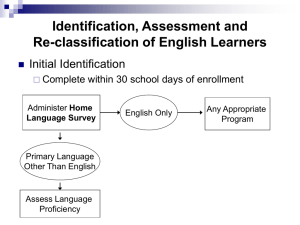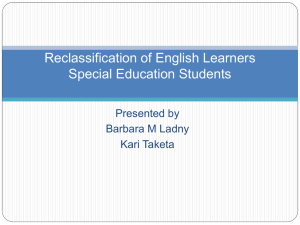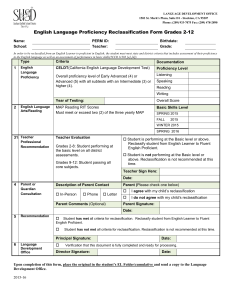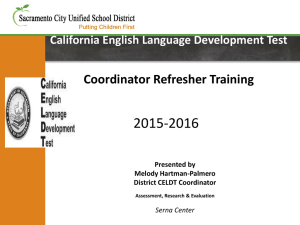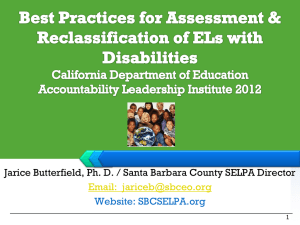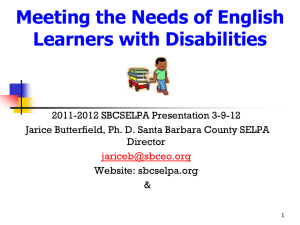ELAC Meeting
advertisement
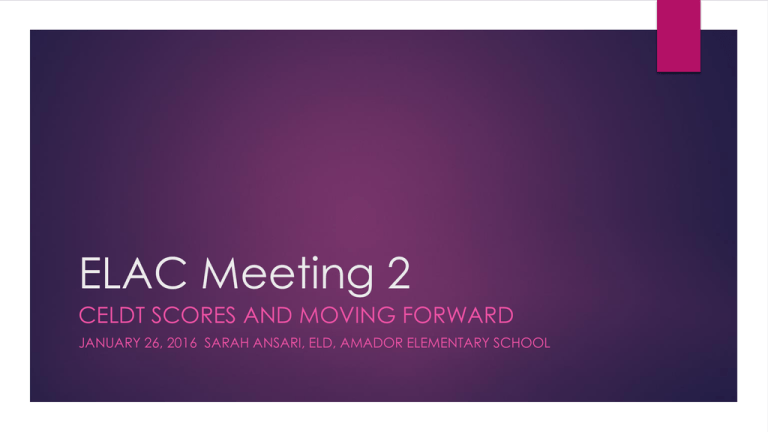
ELAC Meeting 2 CELDT SCORES AND MOVING FORWARD JANUARY 26, 2016 SARAH ANSARI, ELD, AMADOR ELEMENTARY SCHOOL Official CELDT Scores • The CELDT is a test of English skills in the following areas: Listening Speaking Reading Writing Purpose Of CELDT Test: -Identify students who are English Learners -Determine the level of English level proficiency -Assess the progress of English Learner students When a student is given the CELDT test for the first time, he/she is designated as one of the following: Initial Assessment Given to students first entering a California public school, if another home language has been identified by parent or guardian. Early Advanced and Advanced initial scores result in Initially Proficient, Beginning, Early Intermediate and Intermediate scores result in English Learner designation. • Not Limited English Proficient (English Fluent) (if a n Early Advanced/Advanced CELDT score is achieved) • English Learner/Limited English Proficient (LEP) (until all reclassification requirements have been met) *Note: Kindergarteners, 1st, and 2nd graders will continue to be designated as English learners until they take the CELDT test in 3rd grade, even if they are performing well academically. RECLASSIFICATION 2016 Reclassification process will begin after 2nd trimester report cards are issued. In order for a student to be reclassified as English proficient, all of the following requirements must be met: • • Passing score on CELDT(early advanced or advanced overall, and intermediate or above in each sub-category) Academic performance at or above gradelevel standards • Teacher recommendation • Parent notification and consultation This process can begin as early as 2nd grade. Supporting our EL Students At School: Teachers at Amador Elementary School are trained to work with and support English Learners (CLAD certification) Pull-out small group instruction for students who qualify (CELDT scores and/or teacher recommendation) with parent permission Push-in groups in DK, 1st, 3rd grades Supporting our EL Students At home: Read, tell stories, sing songs, ask questions… It is best when families speak their native language at home. It is better for children to hear fluent native language with a rich vocabulary than to hear imperfect, simple English. When students learn academic concepts in their native language, it helps them acquire English. -Judie Haynes Supporting our EL Students At home: Online Resources: http://www.dublinusd.org/Page/9343 http://www.dublinusd.org/Page/9270 Dublin Public Library: Homework Help for Grades 3 to 8 Free Homework Help is available Monday - Thursday from 3:30 to 5:30 pm. Teen volunteers assist children in grades 3 to 8 with their daily school assignments. The first time your child uses the Homework Help program, we ask you to fill out a permission slip. Once the permission slip is on file, your student just needs to sign in and sign out with the Homework Help Coordinator. Homework Help focuses on daily assignments and is not a substitute for professional tutoring, nor should it be used as child care. Homework assistance is also available from the library's website at http://guides.aclibrary.org/homework Contact Dublin Library 925-803-7252 tinyurl.com/litforall2015handout Helping your child with reading comprehension at home: It is important to activate our schema (background knowledge) before, during, and after reading. Examples of making connections •Text-to-Self (T-S) -- connections made between the text and the reader's personal experience, feelings, or life. •I can relate to this book because... •The text says... which reminds me of... •The same thing happened to me and... •I know how the character feels because... •That made me think of the time... •This story reminds me of... Text-to-Text (T-T) -- connections made between a text being read to a text that was previously read. •The character in this book is similar to the character in... •I read another book where... •These two stories are alike because... •This part is just like... •This setting is the same as... •This is similar to... Text-to-World (T-W) -- connections made between a text being read and something that occurs in the world. •This happened in real life... •This event was like the real event... •I think this happened in history before... •This reminds me of something I heard on the news... Other comprehension strategies: Importance of School Attendance A key ingredient for ensuring success in school is helping children — at the beginning of their academic careers — get into the habit of attending school every day. While going to school regularly will not by itself ensure that children learn, missing extended periods of school, especially when children are acquiring the basic academic skills that lead to becoming proficient readers, certainly puts a child at risk. The research shows: • All children, regardless of socio-economic background, do worse academically in 1st grade if they are chronically absent (missing 10 percent or more of school including excused and unexcused absences) in kindergarten. A recent study in California found that only 17 percent of children chronically absent in both kindergarten and 1st grade were proficient readers by the end of 3rd grade as compared to 64 percent of their peers who attended regularly(missing less than 5 percent of school.)• Going to school regularly in the early years is especially critical for children living in poverty, who are less likely to have the resources to make up for lost time in the classroom. Among poor children, chronic absence in kindergarten predicts the lowest levels of educational achievement at the end of 5th grade.• Available well before the results of standardized tests — typically in 3rd grade — chronic absence can be an important early warning sign that intervention may be needed to ensure a child is on the path to success. Questions? Comments? Concerns? Suggestions? I’d love to hear from you! Please feel free to call, email, stop by, leave a note! Sarah Ansari, C-103 307-1950 x6719 ansarisarah@dublinusd.org
